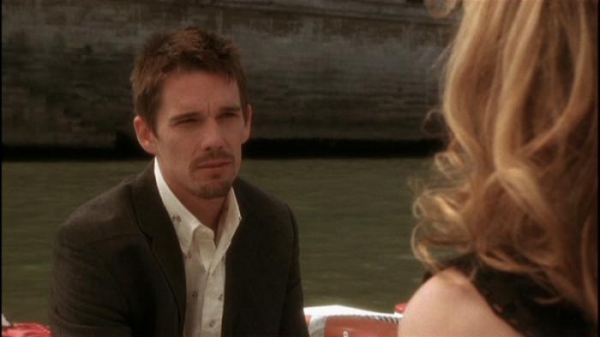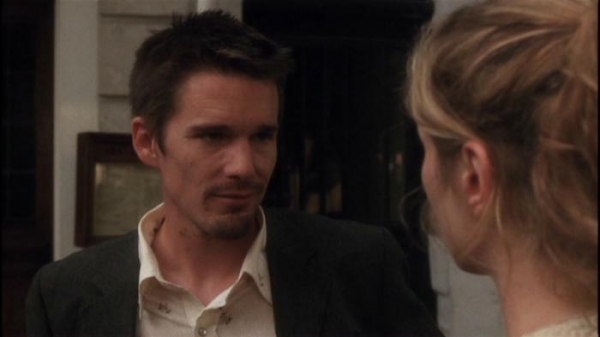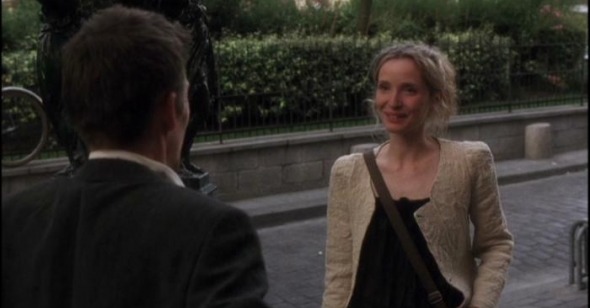Old Haunts
by Suzanne Scott
If there exists one piece of solid proof that aging gracefully is still a possibility in an era of sequels, prequels, and remakes, it’s Richard Linklater’s Before Sunset. While its 1995 predecessor, Before Sunrise, may have exquisitely captured that particular twentysomething moment before we all grow too jaded to believe in the romantic ideal of fate, Before Sunset strips raw the realization that longing, not love, is what truly propels us through life and occasionally weighs us down, forcing us to drown in complacency. Jesse (Ethan Hawke) and Céline (Julie Delpy), though in no way the composites of Gen-X disorientation and dissolution they once were, do exist as universal portraits of dissatisfied adulthood. Successful as they might be, careful as they are in constructing and affirming their own façades of emotional fulfillment, Jesse and Céline’s “relationship” is in no way an escape from their banal realities. It too is a construction, and while it may be an alluring one, which escapes the confines of the day to day, both they as participants and we as viewers are given no reassurances that it will last the span of a lifetime, let alone the span of the film itself. And still, despite—or perhaps as a direct result of—the film’s continual struggle against romantic affectation, Before Sunset does revel in the amorous realities of its locale (Paris, however casually filmed, has been and will likely always be the very definition of “picturesque”) and scenario (which doesn’t need to stoop to crippling catastrophe to exude the same poignancy as An Affair to Remember). Hell, the entire film takes place at dusk, Mother Nature’s official version of Spanish fly.
While perhaps not handled with the same quiet aplomb as Sofia Coppola’s Lost in Translation, Linklater’s meandering conversational progression in light of the veritable landmine that is romantic comedy authorship is a thing to marvel at, jumping from the pair’s initial wide-eyed reunion to timely jibes at the tenuous “freedom friendship” between America and France to their inevitable backseat taxicab confessional, orchestrated with equal parts constraint and chaos as the city of lights careens past the windows. The triumph of the original was its ability to remain deliciously ambiguous, hesitantly hopeful and wary all at once. As we catch up with Jesse and Céline, it becomes quickly apparent that the years have set up even more roadblocks that would seem to make love an impossibility (marriage, a child, and a burgeoning career as an unabashedly autobiographical novelist for Jesse: a turn towards political activism and a string of almost-fiancées for Céline).
These layers of complexity, none easily resolved, inevitably lead to the discovery that it was not their evening in Vienna they’ve been clinging to, nor was it their “connection” as individuals thrown together by chance. Rather, the film is an ode to the human memory’s ability to haunt us to the point of quiet madness. The details of that evening nine years prior, both their recollection in conjunction with our own, has grown fuzzy despite its clarity in the mind of the participants—it has been embellished, rose-tinted, held up as a standard of human interaction that cannot be replicated by either party outside of these particular circumstances. The film itself is formally constructed to haunt, touches never quite reaching their intended target for fear of realization that the other is nothing more than spectral memory, its final frames prematurely fading into obscurity, the voice of deceased chanteuse Nina Simone still wafting off the screen. Before Sunset lingers, eschewing closure, moving onward unseen, unraveling the neat third-act bow we’ve all come to not only expect, but demand.
There will undoubtedly be those narrow-minded few that bemoan this lack of resolution, despite the fact that this is addressed smartly by Linklater early on. In a seemingly innocuous debate over shoe shopping, Jesse suggests that to want is healthy, yet to feel entitled is not. Shoes, love, filmic expectations, they’re all one in the same in Linklater’s world. And the encapsulated world of Before Sunset, boxed in as it may be by finite temporal and spatial borders, is equally vast and eclectic in its implications regarding life, love, and the potentially disastrous and always enthralling amalgamation of the two.

Mortal Beloved
by Michael Joshua Rowin
Though predominantly set in "real time," Before Sunset opens with a montage of the Paris streets, cafés and quays that Jesse (Ethan Hawke) and Céline (Julie Delpy) will soon haunt during their reunion-the shots work as flash forwards that probably won’t be recognized as such until a second viewing. And in its first narrative sequence, punctuated by brief moments from Before Sunrise, Jesse explains an idea for his second novel, one that will be based on the principle that "time is a lie": an adult male, watching his daughter dance to a pop song, simultaneously lives the moment, not just in his mind but in actuality, of a romantic night when he lost his virginity and watched his girlfriend dance to the same tune.
Linklater subtly drops these clues at the beginning of Before Sunset, which then jumps among disparate places and events within Jesse and Céline’s verbal remembrances even though the vast majority of the film’s action unfolds over approximately 80 "naturally" presented minutes. Before Sunset, then, may be one of the most unlikely Proustian, or possibly Resnaisian-films in recent memory (pardon the pun). In order to understand how perfectly this works, rewatch Before Sunrise after Before Sunset. It’s an unsettling experience: one realizes just how sorrowfully fitting Jesse and Céline’s lives have turned out to be, and how each important development has changed the complexion of the past. In Before Sunrise Jesse convinced Céline to spend the day in Vienna with him by invoking a scenario in which she wonders in her future life, stuck in an unhappy marriage, how things might have turned out had she joined him. Now Jesse is the one with the unhappy marriage (which mimics his own parents’ relationship, to boot): that day in Vienna wasn’t a glimpse into an alternate reality for Céline, but for him. And mentioned several times over the course of Before Sunrise, Céline’s grandmother becomes the overseeing spectre of Before Sunset. Her death prevented Céline from meeting Jesse six months later in Vienna, a fateful occurrence that becomes ironic-and recalls Jesse’s story of seeing, as a young child, his dead grandmother appear in a spray of mist from a sprinkler.
In fact, for films that have been and most likely forever will be unfairly categorized as ‘date movies,’ it is startling to consider how both Before Sunrise and Before Sunset are permeated with death. The former may share some generic conventions with the meet-cute romance, but life’s ephemerality keeps coming up in Jesse and Céline’s conversations, whether it be in Jesse’s story about a friend whose only thought in witnessing the birth of his son was that he would eventually die, the visit to the cemetery in Vienna that Céline remembers from her childhood, or Céline’s consideration of Seurat: ‘the human figures are transitory.’ Jesse and Céline share with other Linklater characters a self-consciousness about existing, constantly aware of the moment’s finitude as well as its fullness.
Before Sunset, however, approaches death in a different manner than its predecessor. Although the characters are nine years older, it’s not death itself that has become more real, but the death of youthful ideals and romance. Is there anything more heartbreaking? Jesse states at one point that he doesn’t think people ever really change, and he’s right to some extent-even he himself has retained the same sarcasm and boyishness over time. But the statement is also a cover. The meeting between Jesse and Céline in Before Sunset is so beautifully awkward because it’s apparent that, ‘outside’ the film, they have been suffocating. Jesse has put aside his honest self in keeping a marriage together for his child’s sake; Céline, while working at a humanitarian organization, shares with him her pessimistic view of the world, a view completely alien to the Céline of Before Sunrise; and romance has, most tragically, been put to bed by both. By the end of the film Linklater makes it clear that these are two profoundly disillusioned people, not because they have come to see that the world is a lie in the intervening years, but because their sensitivity has allowed them to be hurt by the compromises and regrets that shape it.
In Before Sunset’s last reel Linklater brings nine years of Jesse and Céline’s disappointments and failed chances achingly to the surface. Their feelings become known to us, but unknown to each other in two remarkable moments. In the first, as Jesse painfully articulates the dreams he has of Céline, she reaches toward him with her arm, pulling it away in hesitation without him ever noticing. In the second, Jesse smiles in surprise as she hugs him goodbye. She never sees his reaction-one of the gentlest and sweetest that I know of in all of cinema-but we do. These are Before Sunset’s two greatest triumphs over the elements that haunt it: spiritual death and the torment of remembrance of things not just past but maybe forever languishing there. Linklater perfectly captures these expressions of human contact, so fragile in their awkwardness, and transforms them into lasting symbols of impossible love-meant solely for our eyes, and hearts.

Things to Come
by Jeff Reichert
What a movie Before Sunset could have been if only Before Sunrise had never existed. Calling Linklater’s latest a masterpiece still feels pretty comfortable, but imagine for a second the implications of Before Sunset as a standalone piece. Imagine a filmmaker who brings two actors in the flush of their early twenties to Vienna in 1994 and asks them to play out for his camera the quintessential one night stand: two strangers from different countries meet on a train, tour Vienna, and fall in love, all in the span of 14 or so hours. A chance accident ruins their planned meeting six months later, and they never meet again. It’s an experience so monumental that the memory of this brief time emotionally cripples their characters (call them Jesse and Céline) for the rest of their lives. Imagine that all along, these two actors and their director know that they’re only creating this Viennese encounter to collect a brief few frames for use in another film, to be set in Paris, but not to be made until all parties involved are nearly a decade older. This film is to be a document, in brief, of the fallout from that long ago night, and the quick flashes of boundlessly enthusiastic youth they’re capturing are planned as harrowing counterpoint to images of these two people in 2004, both of whom carry only a faint glimmer of those earlier selves. The juxtapositions are intended to hit with the force of a jackhammer (and succeed). The changes wrought on faces by those ten years are mere opening volley for the even more striking changes in outlook that unspool during the film’s 80 real-time minutes, where each second hangs heavy with the weight of palpable sadness. The force of those few frames excavated for use in the present casts a shadow over the entirety of Before Sunset, rendering this filmmaker’s radical experiment in time, carried out with Kubrickian obsession over a ten-year span, and executed in the “real” wholly successful.
Of course, Before Sunrise does exist, sullying somewhat my vision of pristine laboratory-like experimentalism, but not by much. It’s nearly impossible to grapple with Before Sunset without considering its younger half, but regardless of your feelings towards either film individually, the diptych they create represents a unit almost without precedent in cinema (for reality-based versions, check out Robb Moss’s 2003 documentary The Same River Twice, which captures these life-time changes with similar wistfulness, and Michael Apted’s Up films). For all its lush, on the sleeve romanticism, Before Sunrise left me mostly cold, in large part due to my dislike of Ethan Hawke’s performance and my suspicion of extended conversation in which idealistic youths prattle on at length about the “big themes.” Somehow, listening to Jesse and Céline from 1994 talk about what could be didn’t affect me nearly as much as their older selves reminiscing over what had and, could have been, which might say more about the person writing this than it does either of the films. Before Sunrise felt too eager to please, too date-ready (read Erik Syngle’s piece), and for all that its artful conception allows it to transcend, the whole enterprise feels fairly minor.
Before Sunset manages the neat trick of being an anti-date movie (it’s all about getting old, folks) wholly suffused with an honest romanticism sorely lacking in contemporary cinema. A bittersweet mixture of love and mortality, each smile or laugh it earns from the audience is hard won. And can we even guess if the ending is happy or sad or both? Perhaps it’s this indeterminacy that makes me love the sequel to a movie I found disposable. Where I can explain what Before Sunrise is, to capture the essence of Before Sunset is impossible—in the mere act of observing, of trying to quantify, the observed object shifts, moves, floats, transforms into something else. Examine more intently, and it only becomes even harder to pin down. Look from another vantage point and you’re likely to see something completely different, yet equally valid. Perhaps the less actually said about it the better.
